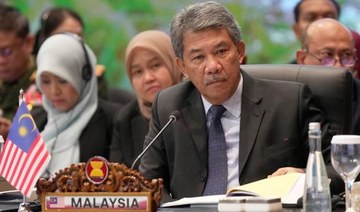MOSCOW: Belarus said Monday that joint air force drills with Russia began on its territory, amid concerns Minsk was being dragged into the Ukraine conflict to fight alongside Moscow.
Minsk’s defense ministry said “joint tactical flight drills of aviation units” from Belarus and Russia had started.
The drills will last until February 1, the ministry said earlier.
“The main goal of the exercise is to increase operational compatibility in the joint performance of combat training missions,” the ministry said in a statement.
All military airfields in Belarus will be involved in the drills, Minsk has said.
The ministry added that the exercises will involve training in aerial reconnaissance, joint patrolling of the state border, tactical air assault landing, the delivery of goods and evacuation of wounded.
Officials have described the drills as defensive.
“The exercise is purely defensive in nature,” Pavel Muraveyko, first deputy state secretary of Belarus’s Security Council, said in remarks carried Sunday by the defense ministry’s Telegram channel.
He added that the situation on Belarus’s border with Ukraine was “not very calm” but Minsk is ready for “any provocative actions” from Kyiv.
President Alexander Lukashenko has insisted that he will not send Belarusian troops into Ukraine.
Belarus allowed Russia — its main political ally and chief creditor — to use Belarusian territory as a launching pad for its Ukraine offensive.
In October, Minsk said it was establishing a joint regional force with Moscow with several thousand Russian servicemen arriving to the country.
Russia, Belarus launch joint air force drills
https://arab.news/rd9vr
Russia, Belarus launch joint air force drills
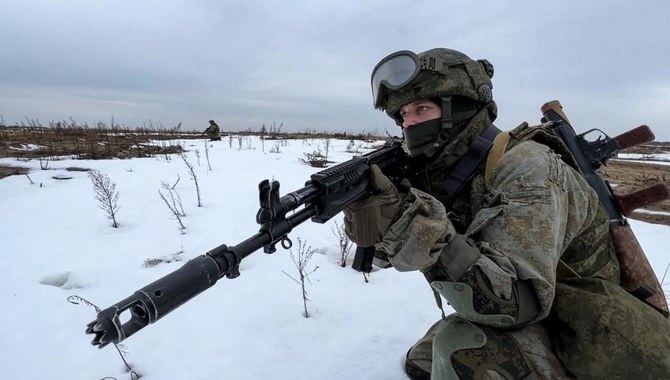
WFP welcomes funding from KSrelief to combat malnutrition in Sudan and South Sudan
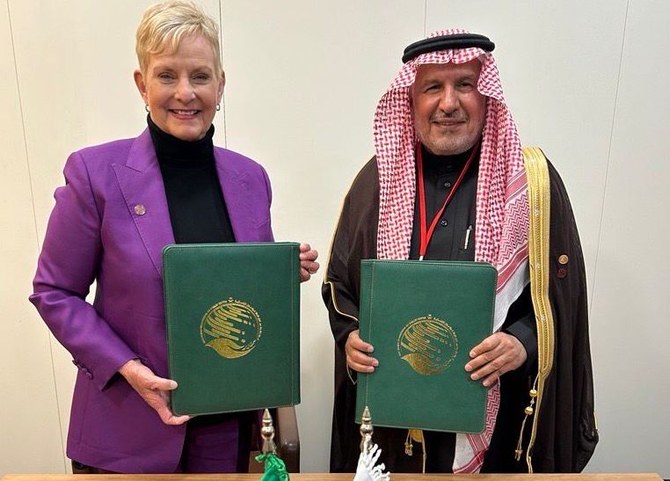
- The funding will benefit over 35,000 children and pregnant or breastfeeding mothers affected by conflict, economic instability, and climate-related disasters
The United Nations World Food Programme (WFP) has signed two agreements worth a total of US$1.4 million with Saudi Arabia.
These agreements aim to provide treatment and prevention measures for malnutrition in Sudan and South Sudan.
The funding will benefit over 35,000 children and pregnant or breastfeeding mothers affected by conflict, economic instability, and climate-related disasters. Specifically, it will aid nearly 29,000 individuals in Sudan and close to 6,000 individuals in South Sudan.
Michael Dunford, WFP's Regional Director for the East Africa region, emphasized the importance of this funding, especially given the dire situation unfolding in Sudan, which is on the brink of becoming one of the world's largest hunger crises. He stressed the urgency of addressing malnutrition to prevent needless deaths and mitigate the long-term consequences of childhood malnutrition.
The agreements were formalized during a pledging conference for the Sudan crisis in Paris, where WFP's Executive Director, Cindy McCain, and Dr. Abdullah Al Rabeeah, Royal Court Advisor and Supervisor General of King Salman Humanitarian Aid and Relief Centre (KSRelief), signed the documents.
Dr. Abdullah Al Moallem, Director of KSRelief's Health and Environmental Aid Department, reaffirmed their commitment to supporting vulnerable populations in Sudan and South Sudan. He highlighted the importance of these projects in providing emergency nutritional aid to children and pregnant or lactating women, which will ultimately contribute to combating famine and malnutrition in both countries.
In Sudan, nearly 4.9 million children under five and pregnant or breastfeeding women face acute malnutrition—a 22% increase from the previous year. South Sudan is also grappling with high malnutrition rates, with approximately 1.6 million children and 870,000 pregnant and breastfeeding women expected to be malnourished this year.
Indonesian coffee takes lead in Egyptian market
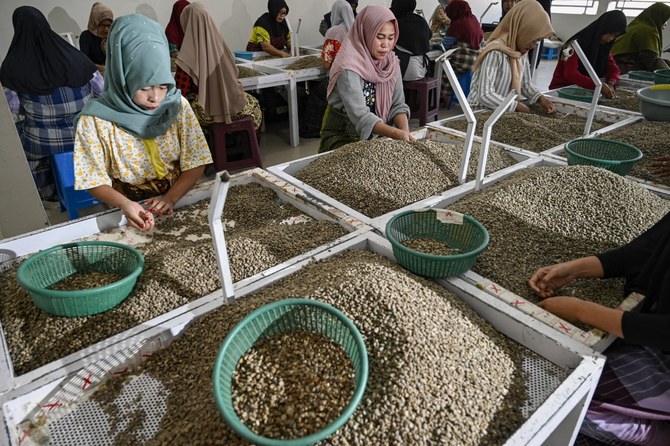
- Indonesia is the world’s 4th-largest coffee producer and Asia’s second-biggest
- Egypt was second-biggest export destination for Indonesian coffee in 2023, behind the US
JAKARTA: Indonesia has become Egypt’s main source of coffee, authorities said on Tuesday, as annual exports reached nearly $93 million, or about 43 percent of the market.
Indonesia is the world’s fourth-largest coffee producer and Asia’s second-biggest. In 2023, the Southeast Asian nation exported around 276,000 metric tons of the commodity worth almost $916 million, according to the Central Statistics Agency.
Egypt was the second-biggest export destination for Indonesian coffee, just behind the US, accounting for about 5.2 percent of the country’s total coffee exports.
“Indonesian coffee has successfully dominated the Egyptian market. Total export value reached $92.96 million, making Indonesia the biggest coffee-exporting country to Egypt in 2023,” Indonesian Ambassador in Cairo Lutfi Rauf said in a statement.
“This shows how Indonesian coffee products are loved by Egyptian consumers. The unique aroma and flavor are the main factors attracting consumers from Egypt.”
Indonesian officials held an annual meeting with Egyptian coffee buyers in Damanhour over the weekend, as they seek to foster good trade relations.
“We hope to continue and to improve trade relations. If there are any challenges, everything can be discussed well for the prosperity and welfare of the people of both countries,” Rauf said.
Indonesian officials have been increasing trade engagement with Egypt as a gateway for exports to other African countries in recent years, while Indonesian coffee producers are seeking to further their exports to the Middle East amid rising interest from the region.
Hariyanto, a coffee exporter from East Java province, said promotion efforts by the Indonesian Embassy in Cairo have helped boost the popularity of Indonesian coffee in Egypt.
“Egypt is a great market, and now there is a high demand for Indonesian-origin coffee products,” Hariyanto, a coffee exporter from East Java province, told Arab News.
“Egyptians found a match in Indonesian-origin coffee, as there is a good fit in terms of price and taste.”
Israel’s old Lebanese allies grapple with new Hezbollah threat
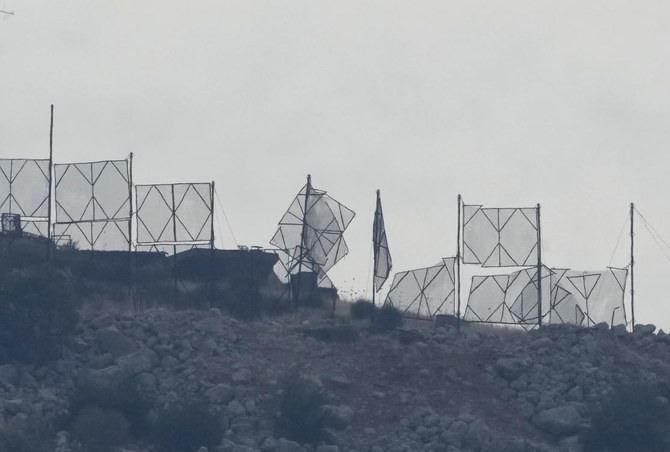
- The South Lebanon Army was a mostly Christian militia recruited by Israel when it occupied south Lebanon in the 1980s and 1990s
The looming threat of a war between Israel and Hezbollah in Lebanon is reviving painful memories for former Lebanese militiamen and their families who fled to Israel, their erstwhile ally, more than 20 years ago.
The South Lebanon Army was a mostly Christian militia recruited by Israel when it occupied south Lebanon in the 1980s and 1990s.
The Zadalnikim, as the SLA’s former members are known in Israel from the group’s Hebrew acronym, sought shelter south of the border in the aftermath of Israel’s sudden withdrawal from Lebanon in May 2000, fearing reprisals from Hezbollah, whom they had fought for years in a brutal and uncompromising conflict.
Iran-backed Hezbollah — a Hamas ally with a large arsenal of rockets and missiles — has exchanged fire with Israeli forces almost daily since Hamas attacked Israel on October 7 triggering war in Gaza.
In response, Israel has carried out strikes deeper and deeper into Lebanese territory, targeting several Hezbollah commanders.
A strip several kilometers (miles) wide on either side of the border has become a de facto war zone, emptied of its tens of thousands of civilian residents.
“They told us to prepare for two weeks in a hotel in Tiberias” in northern Israel, said Claude Ibrahim, one of Israel’s more prominent Lebanese collaborators.
“It’s already been six months. I hope it won’t last 24 years,” he told AFP, referring to his exile from Lebanon.
Ibrahim, a former right-hand man of the late SLA commander Antoine Lahad, was evacuated from the northern Israeli town of Kiryat Shmona, near the Lebanese border, in October when the entire city was emptied.
“It’s as if history repeated itself... generation after generation,” he said, referring to how the Zadalnikim had to flee their homeland after years spent moving from village to village during the Lebanese civil war of the 1970s and 1980s.
Of the 6,000 to 7,000 Lebanese who fled to Israel in May 2000, around 3,500 still live in Israel, according to the authorities. They are registered with the interior ministry as “Lebanese of Israel” and were granted citizenship in 2004.
Shortly after their arrival in Israel — where authorities only partly took responsibility for them — many moved on to Sweden, Germany or Canada. Others returned to Lebanon, where they were tried for collaboration with Israel.
All former SLA members in Israel have relatives in Lebanon, mostly in villages in the south, a few kilometers (miles) from the Israeli border.
Few agreed to be interviewed out of fear of reprisals against their families in Lebanon, whom they stay in touch with via third parties for the same reason.
Maryam Younnes, a 28-year-old communications student at Bar-Ilan University near Tel Aviv, was five when she arrived in Israel with her parents.
When her father, a former SLA officer, died a decade ago, they were able to bury him in their ancestral village of Debel, roughly 10 kilometers (six miles) as the crow flies from Ma’alot-Tarshiha, the northern Israeli town they moved to.
The rest of their family remained in Lebanon, in Debel and the capital Beirut.
With fears growing that the near-daily exchanges of fire across the border might escalate into a full-scale war, Younnes was worried about her relatives.
“I’m very concerned for my family, for my village (in Lebanon),” said Younnes, who sees herself as “half Lebanese, half Israeli.”
“I hope that there will be a way to protect them,” she said, if there is an all-out war with Hezbollah.
Ibrahim was equally worried, although he voiced hope that a new conflict with Israel would “finish off” his old enemy Hezbollah.
“The only solution is a big strike on Hezbollah so that it understands that there is no way forward but through peace,” he said.
Ibrahim said there was no reason Israel and Lebanon should not be at peace.
But Asher Kaufman, a history professor at Notre Dame University in Indiana who specializes in Lebanon and the wider Middle East, said attitudes in Israel had shifted significantly in the decades since the civil war and the cooperation between Lebanese Christian militias and the Israeli military.
The vision of an alliance between “Lebanese Christians and the Israelis, which was at the root of the 1982 invasion (of Lebanon by Israel) has completely collapsed.”
Israel has stopped “viewing Lebanon as the Switzerland of the Middle East,” a peaceful and prosperous country, and now sees it as “a violent quagmire it wants nothing to do with.”
stc Group top workplace in Saudi Arabia, LinkedIn study finds
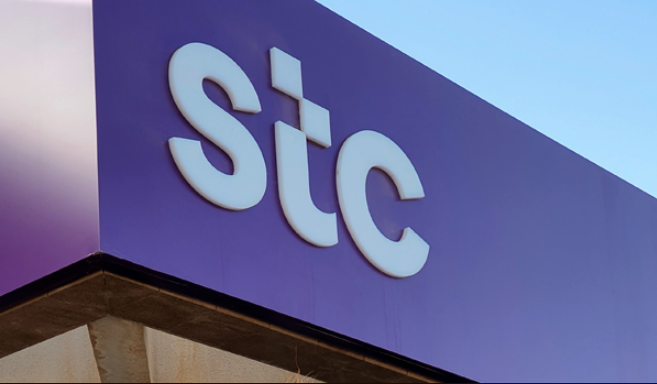
RIYADH: Telecommunications major stc Group has been named the best workplace in Saudi Arabia by the professional networking platform LinkedIn.
According to a press statement, the firm was followed in second place by hospitality giga-project Red Sea Global, with energy giant Saudi Arabian Oil Co., also known as Aramco, ranked third.
Motor vehicle manufacturing company Ceer took fourth place on the list, while ROSHN, backed by the Kingdom’s Public Investment Fund, and Riyad Bank, secured fifth and sixth spots, respectively.
“LinkedIn top companies is an annual list created by data on its platform, which will help professionals identify the top workplaces to grow their careers. The list uncovers the organizations leading the way in growth and learning opportunities for their employees, equity in the workplace, and strong company culture,” according to the report.
Business consulting firm Bain & Co. was named the top organization in the UAE, followed by Mastercard and Procter & Gamble.
“This year’s lists show how companies in the UAE and Saudi Arabia are continuing to grow and expand, which further cements the region’s reputation as a leading business hub,” said Salma Altantawy, senior news editor at LinkedIn.
She added: “Our research has previously indicated professionals’ appetite for new career moves in 2024, and this list recognizes those employers that can be a top choice for professionals looking to make those moves.”
Saudi Entertainment Ventures, also known as SEVEN, was named the tenth-top company in Saudi Arabia, an indication of the sector’s growth in the Kingdom.
“Entertainment companies Miral and Saudi Entertainment Ventures have joined the top 15 companies in the UAE and Saudi Arabia in 2024. Both companies took 10th place in their respective countries, which shows the rise of the entertainment industry across the region,” said LinkedIn in the report.
According to the survey, a majority of regional professionals are considering switching jobs this year and the UAE has seen a growth in hiring over the last 12 months.
In February, stc Group revealed that its net profit in 2023 rose 9 percent to SR13.3 billion ($3.55 billion) compared to the previous year.
In a Tadawul statement, the company revealed that the rise in profit was driven by an SR4.90 billion year-on-year rise in revenues.




